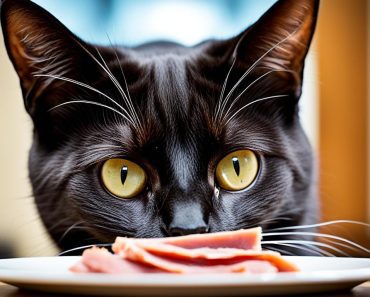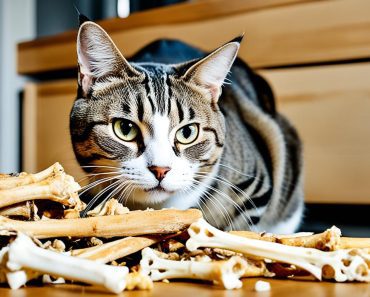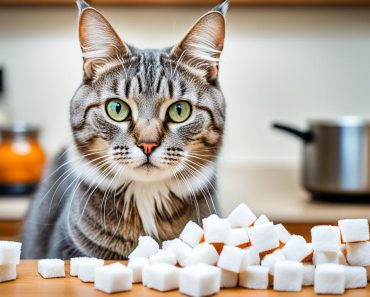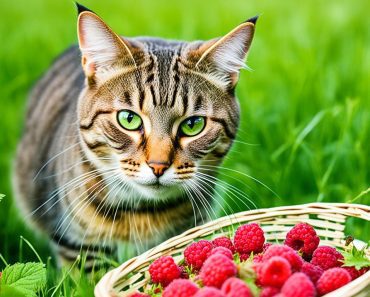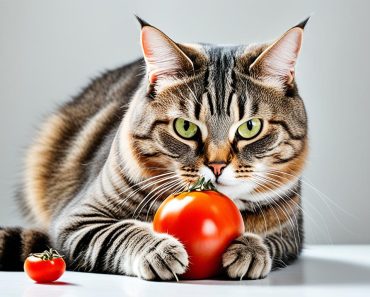As a cat owner, I often wonder if it’s safe for my furry friend to have a taste of my favorite fruits. After all, fruits are packed with essential nutrients that can benefit our bodies. But can cats eat fruit? Let’s find out!
While cats are obligate carnivores, meaning their diets consist mainly of meat, there are certain fruits they can enjoy as an occasional treat. These fruits can provide them with additional vitamins, fiber, and antioxidants. However, it’s crucial to be aware of which fruits are safe and which ones can be harmful to our feline companions.
Can Cats Eat Fruit? Yes, they can, from time to time.
- Cats can eat certain fruits in moderation.
- Safe fruits for cats include apples, bananas, mangos, strawberries, pineapples, and blueberries.
- These fruits can provide vitamins, fiber, and antioxidants to support a cat’s overall health.
- Some fruits, like grapes and citrus fruits, can be toxic to cats and should be avoided.
- Fruits should only be given as treats and not as a substitute for a balanced cat food diet.
Safe Fruits for Cats
When it comes to feeding cats fruit, there are several options that are safe for them to enjoy. While cats are primarily carnivores, incorporating small amounts of fruit into their diet can provide them with additional vitamins, fiber, and antioxidants. However, it’s crucial to know which fruits are safe for cats and which ones they should avoid.
Apples: Apples are a popular fruit choice for cats. They are high in fiber and contain essential vitamins. However, it’s important to remove the stem and seeds as they may contain cyanide, which is toxic to cats.
Bananas: Bananas are another cat-friendly fruit. They are rich in vitamins and potassium. However, due to their high sugar content, they should be offered in moderation as an occasional treat.
Mangos: Mangos are packed with nutrients and can be beneficial for a cat’s digestive health. However, it’s necessary to remove the pit and peel before feeding them to your feline friend.
Strawberries: Strawberries are a favorite among many pets. They are a great source of potassium and fiber. Cats can enjoy strawberries as an occasional treat, but make sure to remove the stems before offering them.
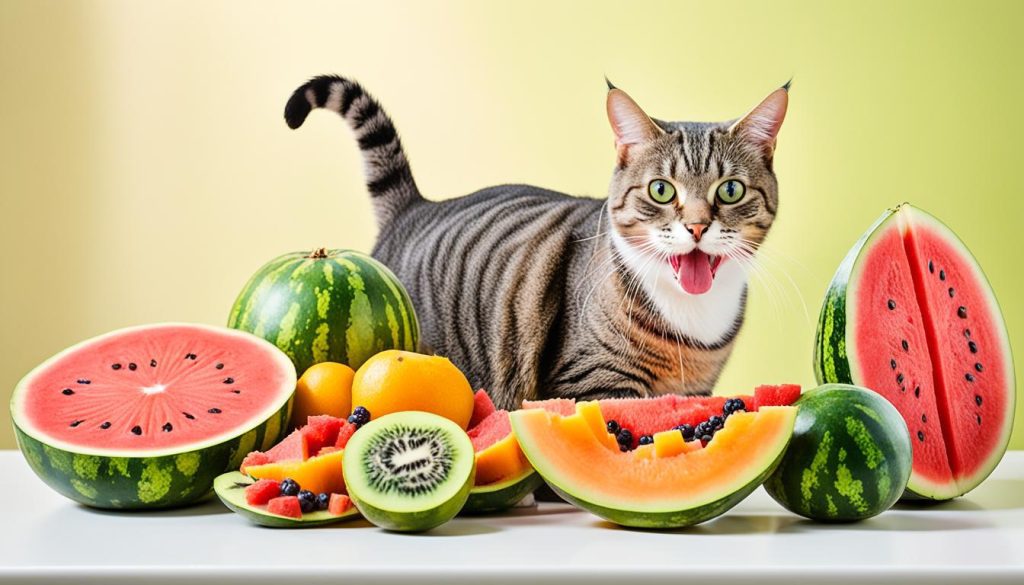
Pineapple: Pineapple is another cat-friendly fruit that can support digestive and immune systems. However, it’s essential to remove the prickly skin and tough peel before offering it to your cat.
Blueberries: Blueberries are high in antioxidants and can be cut into bite-size pieces for cats. They make a healthy and delicious treat for your feline companion.
Always remember to introduce new foods slowly and in small quantities to monitor your cat’s reaction. It’s also essential to consult with your veterinarian before making any significant changes to your cat’s diet.
Benefits of Fruit for Cats
While cats are carnivores, incorporating small amounts of fruit into their diet can offer some surprising health benefits. Fruits such as apples, bananas, and mangos can provide essential vitamins, fiber, and antioxidants that can support your feline friend’s overall well-being.
Vitamins and Nutrients
Apples are not only a tasty treat for cats but also a great source of dietary fiber and vitamin C, which can aid in digestion and boost the immune system. Bananas are rich in potassium, which supports heart health, and vitamin B6, which helps maintain healthy skin and coat. Mangos are packed with vitamins A, C, and E, which are beneficial for eye health and immune function.
Fiber for Digestive Health
The natural fiber found in fruits can help regulate your cat’s digestive system, preventing constipation and promoting healthy bowel movements. Strawberries, for example, are high in fiber and can aid in maintaining regularity.
Antioxidant Power
Antioxidants found in fruits, such as strawberries and blueberries, can help fight against free radicals and oxidative stress in your cat’s body. These antioxidants may offer protection against age-related diseases and support a healthy immune system.
Important Note: Treats, Not Substitutes
While fruits can provide some benefits to your cat’s health, it’s important to remember that they should only be given as treats and not as a substitute for a balanced cat food diet. Consult with your veterinarian to determine the appropriate amount and type of fruits to include in your cat’s diet.
Fruits Poisonous to Cats
While some fruits can be a safe treat for cats, it’s crucial to be aware of the fruits that can be toxic to them. Feeding cats certain fruits can pose risks to their health and well-being. Here are two fruits that should be avoided when it comes to cats:
Grapes and Raisins
Grapes and raisins are known to be poisonous to cats. Consumption of even small quantities can lead to digestive issues and, in severe cases, acute kidney failure. It’s important to keep grapes and raisins out of your cat’s reach to prevent accidental ingestion.
Citrus Fruits
Citrus fruits like lemons, limes, and oranges should also be avoided when it comes to cats. These fruits contain compounds that can cause digestive irritation, leading to symptoms such as vomiting and diarrhea. While citrus fruits may be refreshing for humans, they can pose risks to the sensitive digestive systems of cats.
By being cautious and knowing which fruits to avoid, you can help ensure the safety and well-being of your feline friend. Stick to cat-friendly fruits and always consult with a veterinarian if you have any concerns or questions regarding your cat’s diet.
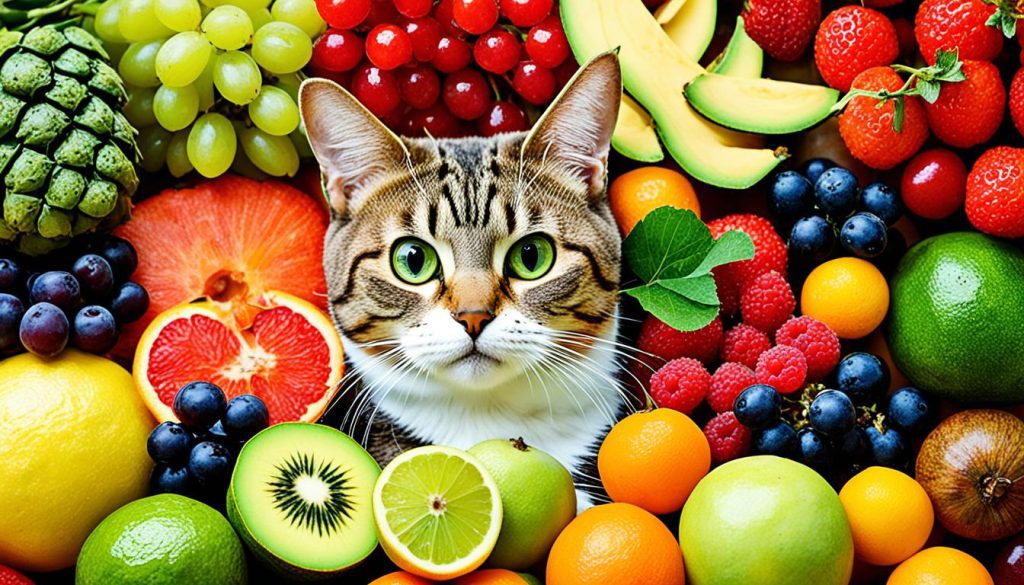
Conclusion
It is safe for cats to eat certain fruits in moderation, and these can provide them with some nutritional benefits. Fruits like apples, bananas, mangos, strawberries, pineapples, and blueberries are considered safe options for cats.
Feeding cats fruit should always be done with caution, as some parts of fruits can be toxic to them. It is important to remove any stems, seeds, and peels that may be harmful to their health.
While fruits can offer vitamins, fiber, and antioxidants that support a cat’s overall health, it is crucial not to rely on fruit as a primary source of nutrition. A balanced cat food diet is still essential for their well-being. Consulting with a veterinarian before introducing any new foods into a cat’s diet is always recommended.
Remember to treat fruits as occasional treats for your cat, and prioritize their dietary needs with a well-balanced meal plan. By following these guidelines, you can provide your feline friend with safe and enjoyable fruit options that offer some additional benefits.

